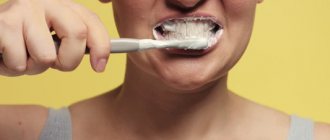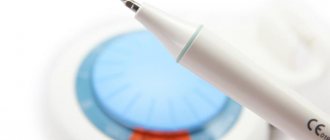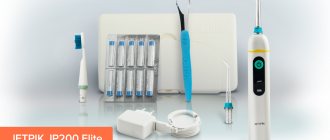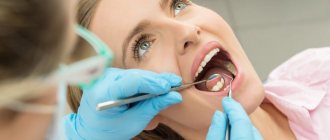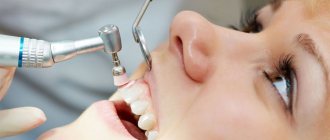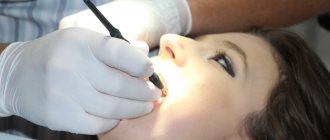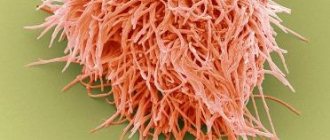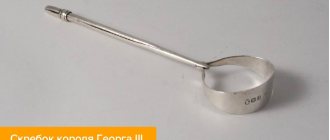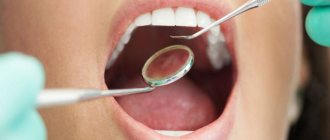Microorganisms that multiply in the oral cavity during caries and gum inflammation can spread throughout the body and lead to the following consequences:
- intrauterine infections,
- exacerbation of inflammatory diseases of the upper respiratory tract,
- indigestion,
- weakening of general immunity,
- increased risk of toxicosis and other complications of pregnancy,
not to mention bad breath, plaque, dryness and cracks in the oral mucosa.
Is it possible to treat teeth during pregnancy?
Most likely, the tooth will decay during this time (the bulk of the minerals go to build the fetal body), damage neighboring ones, and also become a source of infection for the newborn. Let's add a change in the properties of saliva, which, due to its increased viscosity, cannot fully wash and protect teeth, and weak mineralization.
The answer is clear: treat. To do this, you need to choose the right time, place, specialist and materials. The specialists at SM-Dentistry treat their patients very carefully and choose only safe treatment methods.
Carrying out procedures
All dental procedures are carried out after a preliminary consultation with a gynecologist and a general assessment of the need for dental intervention. A thorough examination and high-quality anesthesia are the key to effective treatment of diseases of the hard and soft tissues of the oral cavity.
Regular examination by a dentist and timely prevention of oral diseases are integral components of the health of the mother and fetus. You should not put off visiting a specialist and hope that the problem will solve itself. Modern dentistry has made a big leap in treatment, pain relief and treatment procedures for pregnant women, so if you doubt whether it is worth treating your teeth during pregnancy, then yes, it is definitely worth it.
What to pay attention to when treating teeth during pregnancy
Not every doctor will undertake dental treatment during pregnancy. However, an experienced dentist knows what determines the success and safety of treatment.
At what stage of pregnancy should treatment be carried out?
1st trimester (6-12 weeks). Dental treatment is contraindicated. All organs and systems of the baby are formed; the blood-placental barrier is not formed. Manipulation in the oral cavity can lead to the spread of infection and disruption of fetal development. The ban on treatment especially applies to x-ray examinations.
The exception is diseases in which the main symptom is acute pain. Then minimal intervention is performed to alleviate the condition.
The dentist must be informed about pregnancy, possible allergic reactions, and concomitant diseases.
2nd trimester (13-27 weeks). This is the perfect time to deal with your dental problems. During this period, it is good to carry out the following procedures:
- preventive measures, rehabilitation of potential foci of caries or periodontitis. For example, professional teeth cleaning;
- treatment of gingivitis (inflammation of the gums), which often develops due to hormonal changes and leads to bleeding gums.
- treatment of caries using safe modern materials that do not penetrate the placenta.
- tooth extraction. If the tooth is already destroyed and its removal is indicated, then the procedure is carried out as carefully as possible.
3rd trimester (from 28 weeks).
Again we switch to the most gentle mode. Firstly, the risk of premature birth increases. Secondly, sitting in a dentist’s chair, even the most comfortable one, is no longer very comfortable. The load on the cardiovascular system also increases, which can cause fainting, a drop in blood pressure, or, conversely, a sharp increase in blood pressure.
Effect of anesthesia
Sitting at the dentist's office, people are afraid of the discomfort and pain that always accompany dental treatment. But a solution has long been found - pain relief. How do pregnant women tolerate anesthesia? Are they allowed to take painkillers? Many dentists answer that such an injection is simply necessary. After all, expectant mothers will experience unnecessary anxiety and fear of feeling pain while waiting for their turn to see a doctor. And stress negatively affects the well-being and development of the baby in the womb, so she does not need worry at all and is even contraindicated.
Is it safe to give a painkiller injection to pregnant women? If we are talking about general anesthesia, then its influence can still negatively affect both the child and the expectant mother. But local anesthesia can be done using modern medications. They will perfectly anesthetize a small area of the gum, since they act in a targeted manner, and will limit the pregnant woman from terrible torment in the dental chair during the treatment process. In addition, the dose of the drug is very small, so you should not be afraid that the drug gets to the baby along with the blood; its components will still not pass through the placenta.
Dental prevention during pregnancy
- Treatment of carious teeth and periodontitis before pregnancy.
- Careful dental and oral care. In addition to mandatory brushing of teeth 2 times a day with high-quality toothpaste, it is recommended to use dental floss and rinse to prevent gum disease. You can use gels that restore enamel mineralization, reduce sensitivity and stop caries in the early stages.
- Nutrition should be complete; you can supplement it with vitamin and mineral complexes on the recommendation of the obstetrician-gynecologist who is managing the pregnancy and your trusted dentist.
- Preventive examinations in every trimester. Professional cleaning is usually carried out 2 times a year.
Finding your dentist is no less important than finding a gynecologist. When you trust a specialist, any manipulation will be easy and positive, which will definitely have a positive effect on the health of both mother and child.
Visiograph - an alternative to x-ray
A visiograph is a modern analogue of an x-ray machine. Its advantages:
- Allows you to take an image instantly, high-quality data is immediately displayed on your computer monitor.
- A narrow beam of rays is directed exclusively at the diseased tooth, does not affect adjacent tissues, and certainly cannot “touch” the abdomen.
- The duration of exposure (irradiation) is 10 times lower than when using old-style X-ray machines and is only 0.05–0.3 seconds. Radiation exposure is only 2 microsieverts (when using old devices - from 7 to 80 microsieverts).
For comparison, just sitting in front of the TV for three hours and enjoying your favorite series, a mother receives a radiation dose of 5 microsieverts. The safe radiation dose per year is 1,000 microsieverts (that’s 500 shots). Of course, you shouldn’t take the procedure lightly, but you shouldn’t panic and overestimate the danger to the baby either.
Advantages of contacting PROFI-Dent
- Absolute safety of dental intervention at any stage of pregnancy.
- A team of experienced dentists of all specialties.
- An integrated approach to diagnosis and treatment.
- Unique proprietary therapeutic techniques.
- Affordable prices for the full range of dental services.
Regular toothbrush or electric?
During the first half of pregnancy, a medium-hard toothbrush is suitable. By the third trimester, it is better to choose a soft brush, as this will avoid bleeding gums. Of course, unless there is a tendency to form hard plaque.
If you are used to using an electric toothbrush, then it is better to put it aside during pregnancy and use it only occasionally. Undoubtedly, the electric miracle removes plaque better. However, it has a greater traumatic effect on the gums than a regular toothbrush, and the gums are perhaps one of the most vulnerable places in a pregnant woman’s mouth.
If you really want to thoroughly clean your teeth, leave this procedure to a professional. Cleaning your teeth at the dentist's office will cost about 1,000 rubles.
What radiation doses are dangerous?
Radiation doses greater than 1 rad are dangerous for humans. This is the dose at which mutations occur in the fetus in about 4% of cases. If an X-ray of the entire oral cavity is taken, the woman will not receive a radiation dose of more than 0.0002 rad. If we take into account that the beam is narrow and is not directed at the woman’s uterus, then the fetus will not receive a radiation dose at all. Therefore, we can say with confidence that dental x-rays are safe.
X-rays of the jaw require a higher dose of radiation, but even this dose is too small to harm the mother or fetus
Forgotten caries
Everyone advises planning a pregnancy, but in some situations it is quite difficult. Pregnancy does not always occur when you want it. In some situations, you have to wait for years for the appearance of a lucky star. Preparations can take so long that it’s easy to forget about pregnancy. And there is no need to talk about a random “vagrant bird”. In general, the first thing a pregnant woman needs to do after returning from the gynecologist is to make an appointment with the dentist. The feeling of complete health is often apparent. A careful examination of the dentition will definitely reveal a couple of holes.
Caries is based on three main problems: damage to the enamel, eating a lot of sweets and microflora in the mouth.
During pregnancy, all three causes are hypertrophied. Frequent vomiting in the first trimester can lead to “acidification” of saliva. Increased appetite contributes to the consumption of more easily digestible carbohydrates (sugar, chocolate, etc.).
In an acidic environment and in the presence of carbohydrates, microflora develops quickly. A vicious circle is formed. Microorganisms, breaking down sugar, contribute to even greater acidification of saliva and destroy enamel. Considering the causes of caries, it becomes clear how important prevention is.
Treatment of caries during pregnancy is not contraindicated, rather the opposite. All kinds of holes in the teeth, even small ones, should be healed. Remember that a small hole can be the entrance to a larger cave.
There are no restrictions regarding the filling material. Moreover, it is better to use a fluoride filling material (which uses a special lamp to cure).
Superficial caries, as a rule, does not require mandatory anesthesia. But if ordinary caries is complicated by the development of pulpitis, then you cannot do without an anesthetic. The doctor will select the safest drug.
Bleeding Gums
If you suddenly notice that while brushing your teeth, traces of blood remain on the brush, and when you further rinse your mouth, the foam from the toothpaste turns pink, this means that you have increased bleeding gums. Increased bleeding is a warning sign that all is not well.
Healthy teeth do not necessarily mean healthy gums. Increased bleeding of gums during pregnancy is not uncommon. It may be due to hormonal changes in a woman’s body. To solve this problem, you need to consult a doctor. In this case, the diagnosis sounds like this: “gingivitis of pregnant women.”
To prevent the occurrence of this unpleasant disease, plaque should be removed and tartar in the subgingival area should be removed. In a dental office, these procedures are performed using different techniques. One of them, the so-called “air flow,” is carried out without the use of a bur and without a tip. A stream of air, water and powder flows under pressure. In this way, plaque and partially tartar are removed. This procedure is also called gentle whitening, since the teeth are restored to their natural shine and whiteness, and the enamel structure does not deteriorate.
Another method of preventing gingivitis allows you to completely remove massive deposits of tartar. It requires the use of ultrasound. The procedure is completed by polishing the teeth and coating them with a special fluoride varnish. Both “air flow” and other methods will require significant material costs. The cost is approximately the same - 80-90 rubles per tooth.
As a rule, gum inflammation is caused by “harmful” microflora of the oral cavity.
A number of toothpastes, including extracts of medicinal plants, have an antiseptic effect. Additions of chamomile, calendula, and sage relieve inflammation and strengthen the gums. To enhance the effect of the paste, it is supplied with a complex of vitamins.
If, however, gingivitis does develop, then after removing plaque and tartar, the dentist will most likely suggest using a special gel for the gums; you can read about it in more detail in the “review of oral hygiene products for pregnant women.”
The gel is used in addition to toothpaste, and not instead. If the manifestations of gingivitis are severe, then gingival anti-inflammatory dressings are used. The course is 3-10 sessions. They contribute to the rapid subsidence of the inflammatory process and reduce bleeding.
It is worth checking your toothbrush; sometimes the reasons for increased bleeding of the gums are quite commonplace - the bristles are too hard.
Increased bleeding may be a symptom of a more serious disease - periodontitis. Periodontium is the soft tissue surrounding the tooth. Their inflammation is periodontitis. It is quite severe and can result in the loss of healthy teeth.

